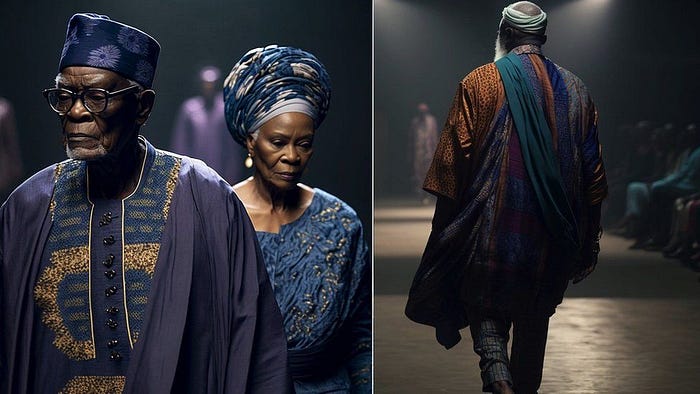views
Nigerian AI artist creates a fashion show for elderly people — Business d’Or

Fashion shows where elderly people model are rare. Models with older African black models are even rarer.
That’s why Nigerian visual artist Malik Afegbua captured the world’s attention last month when he posted images of seniors on the catwalk wearing stylish and colorful clothes on social media.
Entitled “The Elders Series”, the images challenge stereotypes about how older people are perceived and highlight the faces and bodies of Africans who have often been on the fringes of the fashion world.
“The inspiration for (the series) was my mother,” explains Afeghbois, 38. “She had a stroke and I am very close to my mom. I needed her outlet to find a way for her to express herself without thinking about her on life support. I wanted to think of her in her happy place. “
But what’s truly amazing about the image is that no groundbreaking fashion show has ever been held. The image looks like a real event photo, but it’s all created by artificial intelligence (AI). “You keep diving into different depths.”
Twelve years ago Afeghbois was an amateur photographer and visual artist and was given a Canon camera as a gift. He says it gave him the opportunity to start making videos and he made many films and corporate videos as a self-taught filmmaker.
He has created the second and third series of Made by Design for Netflix and the biographical docudrama about Nigerian designer Nike Davis-Okundaya.
“The Elders Series” is a continuation of another project created by Afeghbois with the help of AI. It uses the Midjourney AI platform that generates images in response to text prompts.
Afegbua says he experiments with different phrases, refining his search terms until he gets an image he likes, and then edits it in Photoshop — repeating the process until he achieves the effect he’s looking for.
“When it comes to AI, you put in a text prompt, it gives you something random — you keep going to different depths until you find what you want,” he said.
There has been much controversy over racial and gender bias in AI.
Facial recognition technology can be less accurate for Black skin than White, and AI systems to spot skin cancer have been found to be trained predominantly on White skin. It’s also been noted that AI art platforms can produce pictures that reflect the cultural biases of images found on the internet.
Afegbua said that until his mother’s stroke, he had only worked experimentally with images of Black people on AI platforms, but he found that the images they produced were “mangled up and not very good.”
He noticed that the images produced of Black Americans were different than those of Black Africans. “When you put ‘African’ they look less dapper and in a less nice environment,” Afegbua explained.
Through repeated searches using variations of his text prompts, he says he was able to train the AI and improve the images it produced of Black people.
“Now anyone can go into the AI and put ‘a Black man in a fashion show’ and you are going to get something like what I did, because it’s now in the system,” he said. “Because I did this, the system now has this data.”
“There is always a person behind it”
Afeghbois believes that artificial intelligence can be a powerful tool in the arts, especially in film and television. “I should stay here…
But he says the human creator’s role is still key. “AI isn’t everything. He can’t think for himself, there’s always a man behind him. Heroic, beautiful, African.”
Afegbua says he wanted the city to reflect ancient African civilizations, and “the power that technology would play in that society” if it weren’t for colonialism. But it is “The Elders Series” that has got him the most attention.
Afegbua says that since he shared the images he has been invited to exhibit his work at galleries in the US, France and Brazil, and has signed a deal to work on a Hollywood movie.
But perhaps more rewarding is the recognition he’s received for presenting older people in a positive light.
“I’ve had many associations that have to do with the elderly contact me asking how we can collaborate,” he said, adding that the World Health Organization had been in touch to tell him that it views his work as “a major, positive contributor in the global effort by the WHO/UN’s Decade of Healthy Ageing in combatting ageism.”
“I never thought it would resonate with the world,” Afeghbois said. “I’m glad people are starting these kinds of conversations.”
Business d’Or is a place of motivation for the business world. We are making the world’s most influential leaders and entrepreneurs who are driving change, remodeling organizations and developing a big impact on the world.
Originally published at https://businessdor.com on February 16, 2023.











